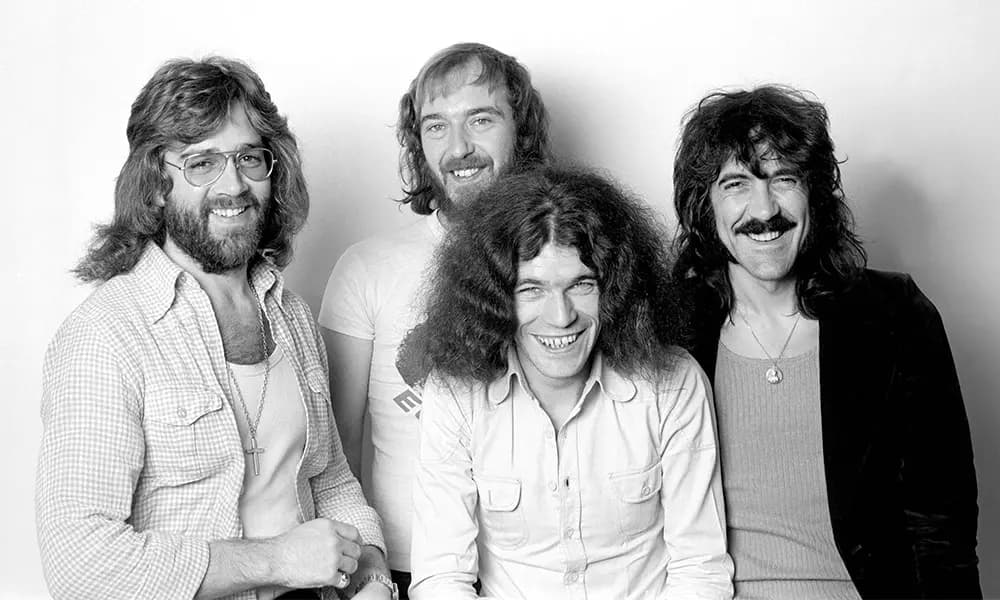
A Ballad of Enduring Pain and Timeless Beauty
This poignant anthem explores the raw ache of heartbreak and the lingering scars left by lost love.
Ah, Nazareth. The very name conjures images of a band that could deliver both thunderous rock anthems and deeply emotional ballads with equal conviction. In the autumn of 1975, amidst a vibrant and ever-evolving musical landscape, this Scottish powerhouse gifted us with a rendition of “Love Hurts” that would etch itself into the hearts of a generation. While the song itself had seen the light of day before, first recorded by The Everly Brothers in 1960 and later gaining traction with a version by Roy Orbison, it was Nazareth‘s raw and impassioned take that truly resonated on a global scale. Climbing to the coveted number eight spot on the Billboard Hot 100 chart in the United States, and achieving significant success in numerous other countries, their version transformed “Love Hurts” from a well-regarded tune into an enduring rock ballad.
The story behind Nazareth‘s decision to record “Love Hurts” is a testament to the serendipitous nature of musical discovery. As the band toured extensively, their guitarist, Manny Charlton, stumbled upon The Everly Brothers’ rendition. Captivated by the song’s melancholic beauty and recognizing its potential for a heavier, more dramatic interpretation, he brought it to the attention of the rest of the band. Lead singer Dan McCafferty, with his uniquely powerful and gravelly voice, embraced the song, imbuing it with a vulnerability that was both unexpected and utterly compelling. It was a departure from some of their more hard-rocking material, yet it showcased their versatility and their ability to tap into universal human emotions.
The meaning of “Love Hurts” is, on the surface, quite straightforward. It speaks directly to the pain and anguish that often accompany love, particularly when a relationship ends. Lines like “Love hurts, love scars, love wounds and mars” are stark and unflinching in their depiction of emotional suffering. However, beneath this seemingly simple message lies a deeper resonance. The song acknowledges the inherent risk involved in opening one’s heart to another. It doesn’t shy away from the potential for heartbreak, yet it implicitly suggests that the experience of love, even with its attendant pain, is a fundamental and significant part of the human condition. For those of us who have loved and lost, the lyrics serve as a poignant reminder that we are not alone in our sorrow.
“Love Hurts” was featured on Nazareth‘s sixth studio album, “Hair of the Dog”, released in April 1975. Interestingly, while the album itself achieved considerable commercial success, it was the ballad “Love Hurts”, released as a single later that year, which arguably became the band’s signature song for many. Its enduring popularity speaks volumes about its emotional depth and the power of Nazareth‘s interpretation. The combination of McCafferty’s heartfelt vocals, Charlton’s soulful guitar work, Pete Agnew’s solid bassline, and Darrell Sweet’s steady drumming created a sonic tapestry that perfectly complemented the song’s lyrical content.
Looking back, “Love Hurts” remains a powerful testament to the enduring appeal of a well-crafted ballad. It’s a song that has transcended generations, finding new listeners who connect with its raw emotion and timeless theme. It reminds us of the bittersweet nature of love, the vulnerability it demands, and the lingering echoes it leaves behind. For those of us who remember hearing it for the first time, perhaps on a crackling radio or a well-worn vinyl record, it evokes a sense of nostalgia for a time when music seemed to speak directly to our souls, a time when a song like “Love Hurts” could articulate the feelings we often struggled to express ourselves. It’s a melody that stays with you, a reminder that even in pain, there can be a certain undeniable beauty.